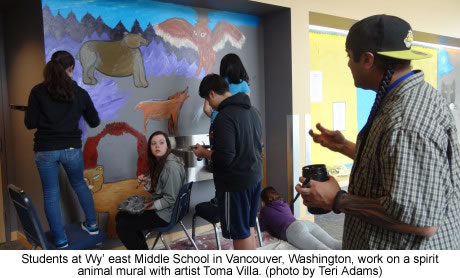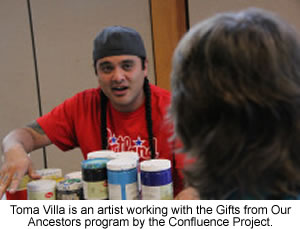 |
Canku Ota
|
 |
|
(Many Paths)
|
||
|
An Online Newsletter
Celebrating Native America
|
||
|
October 2013 - Volume
11 Number 10
|
||
|
|
||
|
Native American Artist
Teaches Heritage to Local Students
|
||
|
by Oregon Public Broadcasting
|
||
|
Villa recounts this time matter-of-factly. "It's just how I grew up," he says. "Everyone grew up with graffiti over here. Everyone had their own little tag name." His coworker Erika Rench puts it more bluntly. "He was a punk,"
she says. Villa, now 35, is handing kids spray paint cans of their
own. Although, more often, he gives them a paintbrush. Villa is one of the artists teaching school children Native American art as part of the Gifts from Our Ancestors program by the Confluence Project. Rench, the program's coordinator, says Villa is one of its most popular artists.
Through the Gifts from Our Ancestors program, Native American artists offer art and heritage lessons in schools located along the Columbia River. Schools apply to the program with ideas for lessons, and 15 are chosen for the program, which is funded by foundations and private donors. The art the students create is on display throughout the year at various exhibitions, including one now open at the Maryhill Museum of Art in Goldendale, Washington. The exhibition includes film, poetry, sculpture, painting and other art forms. "In school we learned a lot about Native Americans just through stuff like Lewis and Clark," says student Tiffany Berquist, who went through the program last year at Wy'east Middle School, "but it was boring because it was in a textbook. Nobody paid attention to that. But this program wasn't anything like that. We had people come in and tell us about their culture that they were actually in — like, firsthand information." Villa, for his part, mostly teaches kids how to draw and paint. But he breaks out the spray paint, too. At Hood River Middle School, he used it on a painting to create a triangle-pattern border reminiscent of Chinook Indian artwork. He was also recently commissioned, in an unrelated project, to paint a large mural of Chief Joseph, the leader of the Wallowa band of the Nez Perce tribe, on the side of the Chief Joseph School in North Portland. He used 40 cans of spray paint to make the piece. The secret to Villa's popularity with kids is how he interacts with them. "I put myself on the same level as them," he says, "and don't act like their boss. Then we enjoy each other's company a lot more." What's more, when he sees the kids, he sees a little of himself. "I know a lot of the kids out there in the Gorge watch the trains go by all the time," he says "and they're constantly looking at the graffiti art … and now I can talk to them and tell them about it."
What
is Confluence Project? Celilo
Arts Education Program |
|
|
||
|
|
||
| Canku Ota is a free Newsletter celebrating Native America, its traditions and accomplishments . We do not provide subscriber or visitor names to anyone. Some articles presented in Canku Ota may contain copyright material. We have received appropriate permissions for republishing any articles. Material appearing here is distributed without profit or monetary gain to those who have expressed an interest. This is in accordance with Title 17 U.S.C. Section 107. | ||
|
Canku Ota is a copyright ©
2000 - 2013 of Vicki Williams Barry and Paul Barry.
|
||
 |
 |
|
|
The "Canku
Ota - A Newsletter Celebrating Native America" web site and
its design is the
|
||
|
Copyright ©
1999 - 2013 of Paul C. Barry.
|
||
|
All Rights Reserved.
|
||
 Toma
Villa was a kid playing in an Oklahoma storm tunnel when a friend
first handed him a can of spray paint. In the '90s, his family moved
to southeast Portland's Mt. Scott neighborhood, and he rarely put
the can down, spending his time on the streets tagging buildings
and train cars.
Toma
Villa was a kid playing in an Oklahoma storm tunnel when a friend
first handed him a can of spray paint. In the '90s, his family moved
to southeast Portland's Mt. Scott neighborhood, and he rarely put
the can down, spending his time on the streets tagging buildings
and train cars. "He
could be there all day," she says, "and as he's doing art he tells
stories of his family and himself as an Indian kid on the street."
"He
could be there all day," she says, "and as he's doing art he tells
stories of his family and himself as an Indian kid on the street."